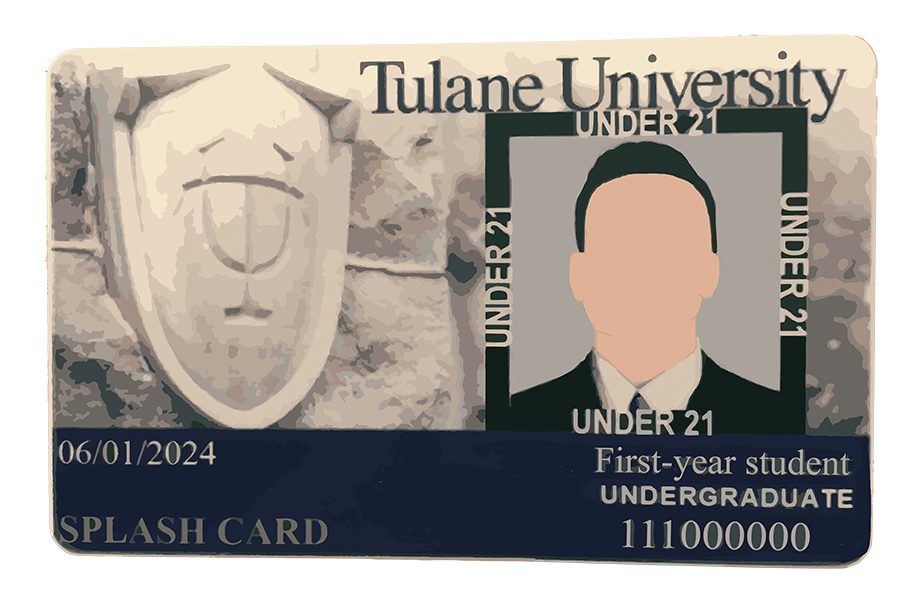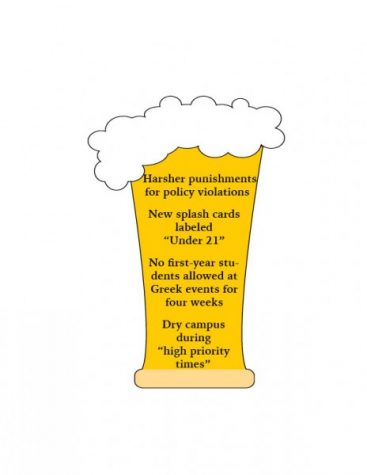Tulane introduces new policies to limit high-risk drinking
After being ranked the No. 1 party school on the Princeton Review’s 2017 College Ranking List, Tulane fell to the No. 3 position this year, behind The University of Delaware and West Virginia University.
While some students say this does little to quell Tulane’s reputation as a party school, the Tulane administration and Interfraternity Council are doing more to limit high-risk drinking, especially among freshmen.
These new policies include harsher punishments for violations, new Splash Cards labeled “under 21” and regulations keeping first-year students from attending wet Greek events for the first four weeks of classes.
These initiatives are designed to make Tulane a healthier campus, according to Vice President of Student Affairs Dusty Porter.
“We know from every bit of data we have that high-risk alcohol use is harmful to our students and impedes their ability to graduate,” Porter said. “We want a Tulane Community that is safe and allows our students to thrive.”
New fraternity policy and “under 21” Splash Cards
Last year, five first-year students were transported to the hospital by Tulane EMS before the first day of classes. Fourteen were transported over the next four weeks.
This year, representatives of the Tulane Interfraternity Council said they hope to reduce this trend of high-risk drinking among new students by keeping them from attending Greek events where alcohol will be present for the first month of classes.
According to Interfraternity Council President David Butler, the decision will benefit both first-year students and fraternities.
“New students will have time to adjust to their new freedoms, and fraternities know that the actions of students who are underage and inexperienced might endanger their charters,” Butler said.
According to Butler, the Interfraternity Council and chapter presidents discussed and voted to implement this new policy and asked the Tulane administration to help them enforce it.
“We asked the administration to provide a way of designating Splash Cards that were connected to freshmen, and the ‘under 21’ box was the outcome,” Butler said.
When first-year students received their Splash Cards, they discovered a green box around their headshot labeled “under 21.”
Porter said he hopes this will limit underage drinking and urges local bar and restaurant owners to consider asking for the Splash Card as a second form of identification.
“The Division of Student Affairs has been working with local bar owners and their ability to reduce under-age and high-risk drinking,” Porter said. “The Splash Card change was a way to allow for them to have an easy way to identify under-age from legal-age drinkers.”
An alcohol-free new student orientation
Tulane administrators said they hoped to limit high-risk drinking by officially making Tulane a dry campus during New Student Orientation.
Any student found guilty of violating the Tulane Code of Student Conduct during this high priority time, which lasted from Aug. 22-26, will be placed on disciplinary probation. A code violation would prevent the student from studying abroad the following semester, participating in fraternity or sorority recruitment, serving in a leadership position or hosting a guest during Mardi Gras.
Porter said he believes the new policy will help foster a welcoming atmosphere.
“Having campus alcohol-free during this time allows us to focus our energy on welcoming students to campus and our community versus dealing with behavioral and medical response issues related to alcohol,” Porter said.
This “high priority” status is the same designation given to campus emergencies, when emergency services need to be devoted to keeping people safe.
New Student Orientation
In addition to implementing new policies, the Tulane administration also rebranded the New Student Orientation for the new freshman class. This year, the orientation extended for five days with events that ran from morning to late at night. Many freshmen, however, said they thought the events were tiring.
“Everyone was so tired, at least I was, and the people I talked to were not really happy that we had such long days,” freshman Abigail Jordon said. “A lot of us wanted time to get ready for classes, but we really didn’t have the time.”
With the high priority period aligning with freshman orientation, some students said they thought there was a decrease in the number of peers who wanted to go out.
“Some students were sneaky about it and they still went out, but I think a lot more students kinda took that as a, you know, during this high priority period, we’re not gonna out, we’ll just wait until this period ends, and then we’ll go out,” junior Wave Leader Justin Reid said.
According to Reid, although these policies may seem effective, the problems Tulane has faced in the past with reckless drinking will not be eradicated immediately.
“We are at Tulane, we are in New Orleans,” Reid said. “That drinking culture isn’t going to just change overnight, even with the implementation of new policies.”
We are at Tulane, we are in New Orleans. That drinking culture isn’t going to just change overnight…
— Justin Reid
Impact on the student population
Last January, Tulane released the results of the climate survey, which revealed that 41 percent of undergraduate women who responded reported experiencing sexual assault during their time at Tulane.
The data also linked sexual assault to alcohol use. 74 percent of women and 87 percent of men who experienced sexual assault reported they were under the influence of alcohol at the time. Porter said the data from the climate survey influenced the new policies.
Title IX coordinator Meredith Smith said these changes are a welcome addition to campus.
“While underage and/or excessive drinking does not cause sexual assault, we know that alcohol is often used by perpetrators of sexual violence,” Smith said.
Butler said though he hopes the new policies will help prevent sexual assault, this was not their primary motivation.
“The climate survey results did not necessarily drive our decision, as this was more targeted at reducing medical transports and overdoses,” Butler said.
Hannah Erbrick contributed to the reporting of this article.
Your donation will support the student journalists of Tulane University. Your contribution will allow us to purchase equipment and cover our annual website hosting costs.


















Leave a Comment